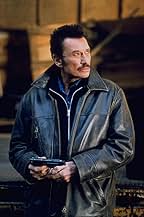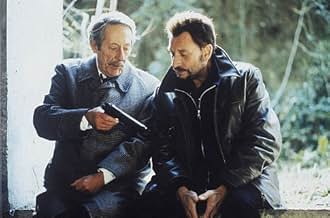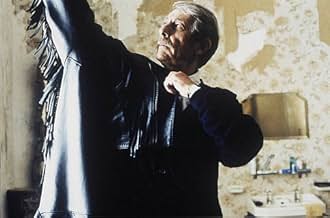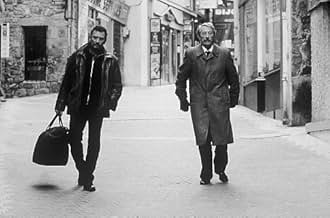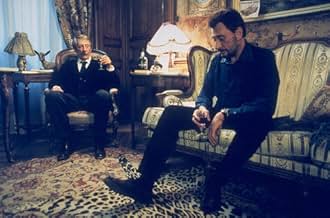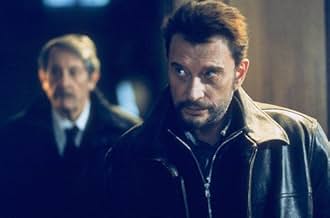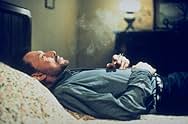VALUTAZIONE IMDb
7,1/10
7726
LA TUA VALUTAZIONE
Un rapinatore di banche arriva per lavorare in una piccola città francese e stringe amicizia con un insegnante di poesia in pensione.Un rapinatore di banche arriva per lavorare in una piccola città francese e stringe amicizia con un insegnante di poesia in pensione.Un rapinatore di banche arriva per lavorare in una piccola città francese e stringe amicizia con un insegnante di poesia in pensione.
- Regia
- Sceneggiatura
- Star
- Premi
- 8 vittorie e 10 candidature totali
Recensioni in evidenza
We know this film from childhood, but the child has grown. Here we are in a provincial French city when the cowboy rides in on the iron train to transform the life of a citizen, unexpectedly, profoundly.
Jean Rochefort, with his great face of character, about to go for major surgery, a three vessel bypass, a wifeless man of regrets, a retired teacher of literature to secondary students, is about to meet his fantasy: Johnny Hollyday (the Elvis of France?) who plays a bank robber about to perform his retirement job. Meeting by apparent chance, though clearly pre-ordained, the fantasies of the lonely, anxious teacher whose love of poetry might be his most tender trait in an otherwise ruthlessly real view of the world, are set in motion. Hollyday becomes his unexpected guest...the lone hotel is closed for the season...and an excitement comes to Rochefort's life. The man has guns. There is a picture of him looking terribly western in his leather jacket, the enigmatic stranger/cowboy in the mythos of his host. Ah, to be that man, to fire that gun, to live that life of dark adventure.
It goes on to its meaningful end, not told here except to say that the last scene may be an error, a prolongation that was unnecessary and added nothing to the power of the film, nor detracted from the marvelous performance of Rochefort, who can do no wrong with any role, or Hollyday, whose acting turn here is perfect in the Robert Mitchum noir sense, but tinged with an old-world tiredness that is quite moving. All this with fine subsidiary acting, a perfectly murky Simenonoish setting, and Schubert's melancholic sounds. Ah, bon. Tres, tres bon.
Jean Rochefort, with his great face of character, about to go for major surgery, a three vessel bypass, a wifeless man of regrets, a retired teacher of literature to secondary students, is about to meet his fantasy: Johnny Hollyday (the Elvis of France?) who plays a bank robber about to perform his retirement job. Meeting by apparent chance, though clearly pre-ordained, the fantasies of the lonely, anxious teacher whose love of poetry might be his most tender trait in an otherwise ruthlessly real view of the world, are set in motion. Hollyday becomes his unexpected guest...the lone hotel is closed for the season...and an excitement comes to Rochefort's life. The man has guns. There is a picture of him looking terribly western in his leather jacket, the enigmatic stranger/cowboy in the mythos of his host. Ah, to be that man, to fire that gun, to live that life of dark adventure.
It goes on to its meaningful end, not told here except to say that the last scene may be an error, a prolongation that was unnecessary and added nothing to the power of the film, nor detracted from the marvelous performance of Rochefort, who can do no wrong with any role, or Hollyday, whose acting turn here is perfect in the Robert Mitchum noir sense, but tinged with an old-world tiredness that is quite moving. All this with fine subsidiary acting, a perfectly murky Simenonoish setting, and Schubert's melancholic sounds. Ah, bon. Tres, tres bon.
European cinema again; again originality, again stuff almost unique that I'm afraid I'll never find something similar. Here, the story about two people, and those two alone, and it is not easy two keep up ninety minutes developing their experiences. You need to have a good eye, pace, and respect for your characters.
These characters are Milan (Johnny Hallyday), a thief; and Monsieur Manesquier (Jean Rochefort), a retired literature professor. Their differences make their encounters scary. One, an old man who likes to talk and is fascinated by this mysterious obscure man in strange clothes; Manesquier enters Milan's room and imagines to be in a fantasy world he couldn't live in.
Milan is quiet and soft talking, but induces the old man into the drinking again, into excitement and adventures; and after meeting his pals he even doubts about carrying on with the only thing he came to do to this town: rob a bank. He reaches the limit of giving a literature lesson to one of Manesquier's pupils.
The camera is in love with them both, and presents each one in an original way when they are on screen. Different colors, postures, followings. Each one might hide something; there's a past, but that's not what this story that wanders through coincidences and casualties of life wants to show.
A simple aspirin, a glass of water; what can that lead to. The anxiety of a man to be part of something he never lived, on one side. On the other side the silence and intrigue of the little conversation. The glasses of wine, the lunches that seem to say much but are saying almost nothing about the characters.
The music, by Pacscal Estève, is very important to the film; giving to it a touch of Westerns style, playing to represent the state of mind and humor of the characters when we see them, or simply, not playing at all; and that's very good sometimes. Ivan Maussion's production design is also a good point for that matter, with his deserted streets and lonely places.
The screenplay results to be cultured and very intelligent. Patrice Leconte's frequent writing collaborator leaves everything in his character's hands; because the words are his. Also frequently cast by Leconte, Jean Rochefort's delivery is impressing in his measured role, that requires little but well done. It's Johnny Hallyday, however, the one who steals, or shines in his loneliness. With all those looks and his face, always full of hidden things.
Metaphors join us again, in the movie; for us to interpret. I tried, and everyone will, but I say: thank Europe for these movies; it's worth and more a kind of pleasure to watch them!
These characters are Milan (Johnny Hallyday), a thief; and Monsieur Manesquier (Jean Rochefort), a retired literature professor. Their differences make their encounters scary. One, an old man who likes to talk and is fascinated by this mysterious obscure man in strange clothes; Manesquier enters Milan's room and imagines to be in a fantasy world he couldn't live in.
Milan is quiet and soft talking, but induces the old man into the drinking again, into excitement and adventures; and after meeting his pals he even doubts about carrying on with the only thing he came to do to this town: rob a bank. He reaches the limit of giving a literature lesson to one of Manesquier's pupils.
The camera is in love with them both, and presents each one in an original way when they are on screen. Different colors, postures, followings. Each one might hide something; there's a past, but that's not what this story that wanders through coincidences and casualties of life wants to show.
A simple aspirin, a glass of water; what can that lead to. The anxiety of a man to be part of something he never lived, on one side. On the other side the silence and intrigue of the little conversation. The glasses of wine, the lunches that seem to say much but are saying almost nothing about the characters.
The music, by Pacscal Estève, is very important to the film; giving to it a touch of Westerns style, playing to represent the state of mind and humor of the characters when we see them, or simply, not playing at all; and that's very good sometimes. Ivan Maussion's production design is also a good point for that matter, with his deserted streets and lonely places.
The screenplay results to be cultured and very intelligent. Patrice Leconte's frequent writing collaborator leaves everything in his character's hands; because the words are his. Also frequently cast by Leconte, Jean Rochefort's delivery is impressing in his measured role, that requires little but well done. It's Johnny Hallyday, however, the one who steals, or shines in his loneliness. With all those looks and his face, always full of hidden things.
Metaphors join us again, in the movie; for us to interpret. I tried, and everyone will, but I say: thank Europe for these movies; it's worth and more a kind of pleasure to watch them!
1st watched 8/9/2003 - 7 out of 10(Dir-Patrice Leconte): Wonderful drama about two men who want to switch places in life because each is bored of what their life has become. One is a bank robber, and the other is a retired poetry teacher. The bank robber is plain tired of the excitement and the other wants excitement in his life. The retired poetry teacher also has an upcoming triple-bypass heart surgery that lends to his aggressiveness about trying out the other lifestyle. Like many French dramas, this movie takes it's time and explores the characters and let's us get to know them. This is `so' lacking in most American films these days and therefore this is a breath of fresh air for those who are okay with reading subtitles. While watching this movie you get the feeling that you're watching two `real' people interacting despite their differences. Do they ever switch places? Well, sort of but like other French dramas `reality' is where the film stays for the most part. The ability for the characters to understand and accept each other is `just' wonderful and makes a wonderful statement about how we should `all' interact and I think this is what makes this film remarkable.
"Man on the Train (L'Homme du train)" is a small story of cumulative details done exceedingly well that could simply not be done by Hollywood.
The excellent leads, each charismatic in his own way, talky Jean Rochefort and taciturn Johnny Hallyday (who brings none of his pop star baggage to an American audience), are past middle age. There is a lot of Rohmer-like sitting around talking over a bottle of wine.
The emphasis is on very gradual, internal realizations by each character that are revealed by a subtle accretion of surprising little decisions, such as wearing slippers or getting a new haircut, culminating in an unpredictable, yet beautifully satisfying conclusion.
Photographed in a shades of gray palette that is almost in black-and-white, a small town and its interconnections and personalities are beautifully evoked.
The women in their lives are ancillary, which is just as well, as they are not completely believable.
The poetry teacher is too sophisticated to quote John Greenleaf Whittier, but I will, on the theme: "Of all the words of tongue or pen/the saddest are these/It might have been."
The excellent leads, each charismatic in his own way, talky Jean Rochefort and taciturn Johnny Hallyday (who brings none of his pop star baggage to an American audience), are past middle age. There is a lot of Rohmer-like sitting around talking over a bottle of wine.
The emphasis is on very gradual, internal realizations by each character that are revealed by a subtle accretion of surprising little decisions, such as wearing slippers or getting a new haircut, culminating in an unpredictable, yet beautifully satisfying conclusion.
Photographed in a shades of gray palette that is almost in black-and-white, a small town and its interconnections and personalities are beautifully evoked.
The women in their lives are ancillary, which is just as well, as they are not completely believable.
The poetry teacher is too sophisticated to quote John Greenleaf Whittier, but I will, on the theme: "Of all the words of tongue or pen/the saddest are these/It might have been."
'The Man on the Train' is a beautiful movie about two man later in life. One of them is a bank robber, the other is a teacher. They meet by accident and become friends. Slowly they both start wishing they would have been the other man.
The teacher (Jean Rochefort) knows what the bank robber (Johnny Hallyday) does for his money. He even offers to help, but the day the bank will be robbed he has to go into surgery. We see how the teacher pretends to be a cool guy, even changes his looks to that. We also see how the bank robber pretends to be a teacher when the real teacher is out.
All this leads to an ending that closes things in one way, but leaves things open in another. We feel an ending like this coming, but it still works. It is beautiful and fits the rest of the movie perfectly.
If your favorite movies are like 'The Fast and the Furious' you will probably not like this. It is a real European movie, sometimes slow, most of the time very quiet, but if you can appreciate this kind of film making you will like 'The Man on the Train'.
The teacher (Jean Rochefort) knows what the bank robber (Johnny Hallyday) does for his money. He even offers to help, but the day the bank will be robbed he has to go into surgery. We see how the teacher pretends to be a cool guy, even changes his looks to that. We also see how the bank robber pretends to be a teacher when the real teacher is out.
All this leads to an ending that closes things in one way, but leaves things open in another. We feel an ending like this coming, but it still works. It is beautiful and fits the rest of the movie perfectly.
If your favorite movies are like 'The Fast and the Furious' you will probably not like this. It is a real European movie, sometimes slow, most of the time very quiet, but if you can appreciate this kind of film making you will like 'The Man on the Train'.
Lo sapevi?
- QuizJean Rochefort died in October 2017. Two months later, Johnny Hallyday died.
- ConnessioniReferenced in 69 minutes sans chichis: Johnny Hallyday (2015)
- Colonne sonoreImpromptu in A-flat Major, Op. 142 No. 2 (D. 935)
Written by Franz Schubert
I più visti
Accedi per valutare e creare un elenco di titoli salvati per ottenere consigli personalizzati
- How long is Man on the Train?Powered by Alexa
Dettagli
- Data di uscita
- Paesi di origine
- Sito ufficiale
- Lingua
- Celebre anche come
- Man on the Train
- Luoghi delle riprese
- Aziende produttrici
- Vedi altri crediti dell’azienda su IMDbPro
Botteghino
- Lordo Stati Uniti e Canada
- 2.542.020 USD
- Fine settimana di apertura Stati Uniti e Canada
- 41.138 USD
- 11 mag 2003
- Lordo in tutto il mondo
- 7.727.906 USD
- Tempo di esecuzione1 ora 30 minuti
- Colore
- Mix di suoni
- Proporzioni
- 2.35 : 1
Contribuisci a questa pagina
Suggerisci una modifica o aggiungi i contenuti mancanti


